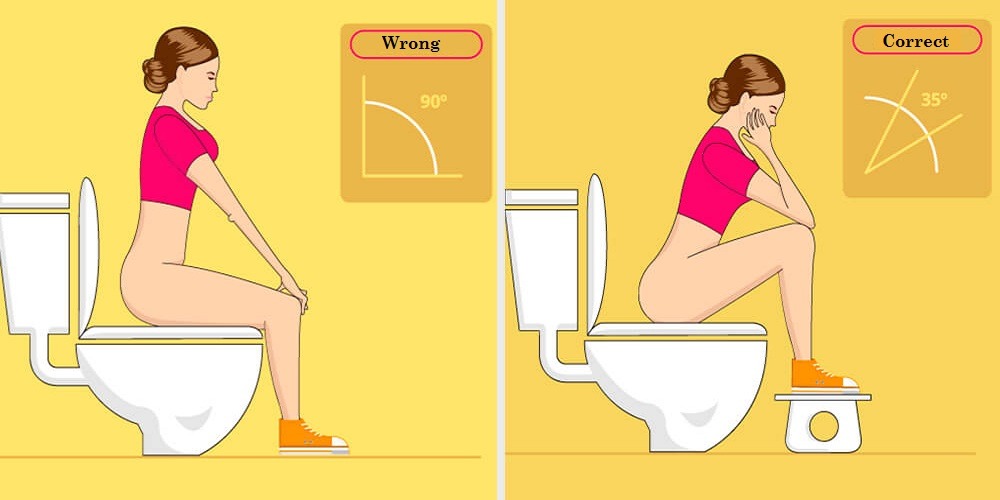Although in some cultures the topic of evacuation is still taboo, it is important for our health to know what is the correct way to evacuate. Learn more about this topic.
The toilet: an object of “luxury”
Since Sir John Harington invented the toilet, in the year 1591, they changed our patterns to evacuate. In its beginnings, it was considered an object of “luxury”, since not everyone had access to one, only royalty. It was also accessible to the disabled, but as exceptional cases.
With the development of the plumbing, this piece of furniture was mass produced in order to give ordinary people the same “privilege” reserved for wealthy people. This was how the use of the toilet changed the habit of defecating in squatting and, consequently, our patterns were altered to evacuate.
Scientific arguments: it is better to squat
Dr. Henry L. Bockus, in his book “Gastroenterology” of the year 1964, concluded that for an ideal defecation it is necessary to squat with the thighs stuck to the abdomen. Similarly, in 1966, Dr. Alexander Kira argued in his book “The Bathroom” that human nature required to perform their needs in squatting, because it reduces the effort to defecate.
On the other hand, in 2003, Dr. Dov Sikirov published a study comparing the forces applied at the time of sitting and those used in the squat position during defecation. The results confirmed the feeling of intestinal emptying satisfactory for the squat position. In the position of sitting defecation requires excessive exertion and more time compared to the squatting posture.
“The ideal position for defecation is squatting”
Henry L. Bockus. Doctor in medicine
What happens when evacuating?
The term defecation can be defined as the process through which the final product from digestion is eliminated. During this journey, the enteric nervous system and the parasympathetic system allow various actions such as the control of the accumulation of fecal matter in the colon, as well as the relaxation of the external sphincter and the puborectalis muscle.
This action allows alignment with the rectum to make intra-abdominal pressure and expel waste.
Squatting
It is important to point out that when defecating in crouches, the legs are placed at 35º with respect to the body. In this way, the thighs press against the abdomen. This action causes pressure inside the colon cavities, releasing and aligning the anal canal and elimination. This results in faster, easier and more complete evacuations.
When sitting
When sitting, the opposite happens in a squat. In this position, the legs are at a 90º angle with respect to the abdomen pressing against the muscles, so there is no alignment between the rectum and the anus.
Likewise, the pressure exerted by the legs towards the colon and abdomen is lost. As a result, pushing down to achieve evacuation is required. This position causes various diseases, such as constipation, irritable bowel syndrome, hernias, hemorrhoids and, in more severe cases, colon or bowel cancer.
Benefits of adopting the squat position when evacuating
- It allows stool elimination to be much quicker and easier.
- It prevents the leakage of matter between the colon and the small intestine, which reduces the chances of contaminating the small intestine.
- Avoid tension in the area preventing hernias, diverticulosis, among other ills.
- It is part of the non-invasive treatment in case of hemorrhoids.
- In the case of pregnant women, this position avoids pressure on the uterus. In fact, it helps in the preparation of natural childbirth.
- By completely evacuating waste, it prevents fecal stagnation. This condition is one of the most important factors in cases of appendicitis and inflammatory bowel disease.
It is important to mention that the position of 90 ° during the evacuation is associated with the possibility of suffering from colorectal cancer (CRC). However, a study conducted by Sahand Sohrabi shows that such a hypothesis is not yet conclusive.
How can I apply it?
In the area of furniture design, there are few initiatives that consider the squatting position at the time of evacuation. However, we can adapt our toilet using a stool. It is not necessary that it be of a specific height, but it does allow us to place ourselves in a position of 35º.
On the other hand, some people decide to get on the toilet to adopt this position. However, such action can be dangerous, since the toilet can be broken or the person may fall. Definitely, the last option is not advisable.







